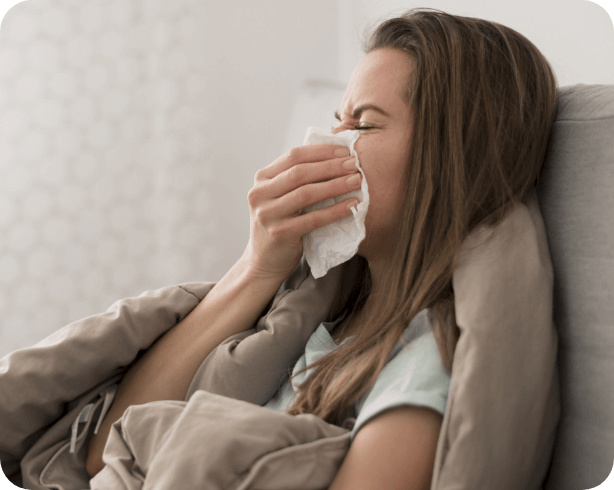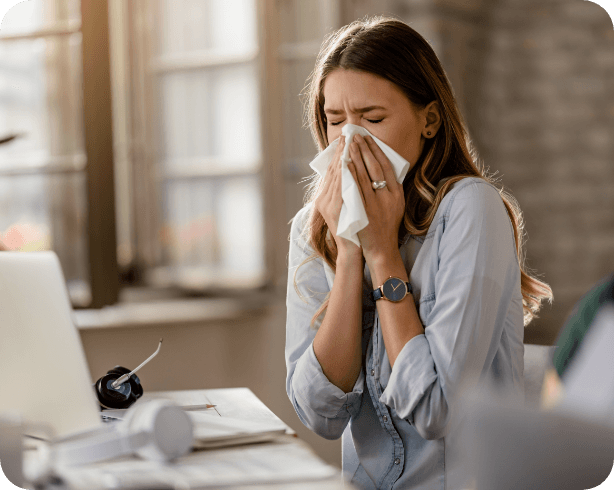Kirrawee Doctors are passionate about keeping people happy and healthy.
Understanding common illnesses is crucial for maintaining optimal health, so we’ve created a guide to navigating the symptoms, prevention, and treatment of some of the most common illnesses.
Common Cold
Colds are most common during the winter months, primarily caused by viruses, and are spread through sneezing, coughing, and hand contact.
Symptoms include:
- Runny or stuffy nose
- Sneezing
- Sore throat and cough
- Swollen lymph glands
- Headache
- Red eyes
- Nausea
- Vomiting
- Occasional fever
- Loss of appetite

While there's no cure, symptom management includes rest, hydration, and over-the-counter medications. Paracetamol reduces fever, fluids soothe discomfort, nasal drops alleviate congestion, and throat lozenges provide relief from sore throats. Things like antibiotics, cough medicines, cold remedies, and aspirin should be avoided.
Preventing colds involves good hygiene, like handwashing and hand sanitiser, avoiding close contact with sick individuals, and a healthy lifestyle. Vitamins have been proved ineffective in increasing resistance.
For those with symptoms resembling both colds and COVID-19, immediate advice and testing are crucial. COVID-19 symptoms include loss of smell or taste, fever, chills, sweats, cough, sore throat, shortness of breath, runny nose, headache, muscle soreness, and gastrointestinal symptoms.

Influenza
Influenza (flu) is a contagious respiratory infection, often causing severe health issues like pneumonia. It spreads through respiratory droplets and is seasonal, typically from April to September. Amid the ongoing COVID-19 pandemic, continued seasonal flu activity is expected. Vaccination is crucial, as flu symptoms overlap with COVID-19, requiring prompt testing for those with flu-like symptoms.
The most common symptoms of the flu are a dry cough, sudden high fever, fatigue, body aches, sore throat, and a runny nose, while Covid-19 symptoms include loss of smell/taste, fever, chills, sore throat, shortness of breath, and a runny nose, among other more severe symptoms.
There are a few things you can do to prevent yourself from getting the flu:
- Annual vaccination is recommended for everyone aged six months or older, with eligible groups receiving free flu shots.
- Hygiene practices include frequent handwashing, hand sanitiser, and covering nose/mouth when coughing or sneezing.
- Avoid close contact with sick individuals and practice social distancing during flu season.
- Boost immune system through a nutritious diet, and regular exercise if you are able.
Treatment includes taking antiviral medications early to reduce symptom severity, prioritising rest and hydration, and over-the-counter medications like pain relievers, decongestants, and cough suppressants to manage symptoms. Distinguishing the flu from the common cold is vital due to heightened severity. Seeking immediate medical attention ensures proper guidance and care, especially for those at higher risk.
Conjunctivitis
Conjunctivitis is an inflammation of the thin, transparent layer covering the eye. It most commonly affects children, particularly under five. Although the risk of getting conjunctivitis decreases with age, it’s still possible for adults to be infected.
Symptoms include watery eyes, redness, excessive tears, itching, light sensitivity, swollen eyelids, and pus discharge, usually lasting two to three weeks. To curb its spread, children with conjunctivitis should stay home from school or daycare until eye discharge ceases.
To prevent obtaining conjunctivitis, good hygiene practices are encouraged, and avoid eye touching when possible. If diagnosed, antibiotic drops or ointment are prescribed for treatment and to prevent further contagion. Other treatment options include a warm compress, antihistamines, and antibiotics. It’s crucial to remain vigilant as long as there is discharge.
Seeking professional advice is vital, especially if symptoms persist or worsen, to prevent the spread of infectious conjunctivitis.
Allergies
Allergies occur when the immune system reacts to substances that are usually harmless. Common allergies include hay fever, hives, food allergies, and pet dander. Symptoms for these include:
- Sneezing and runny nose: Allergens such as pollen, dust mites, or pet dander can cause nasal irritation.
- Itchy or watery eyes: Exposure to allergens may lead to red, itchy, and watery eyes.
- Skin reactions: Allergic reactions can manifest on the skin, causing hives (itchy welts) or eczema.
- Coughing or wheezing: Respiratory allergens can lead to coughing and wheezing, especially in individuals with asthma.
- Fatigue: Chronic exposure to allergens can result in fatigue and a general feeling of fatigue.
- Abdominal pain and vomiting: Insect allergies are known to sometimes cause abdominal pain and/or vomiting.
- Others: Swelling of the lips, face, eyes, and tongue, throat tightness, and headaches are other common symptoms of allergies.

These symptoms are common with many other medical conditions, so it’s crucial you do not self-diagnose. If you experience any of these symptoms, it’s important you see a medical practitioner as soon as you can.
Preventing allergies involves adopting a proactive approach to minimise exposure to potential allergens. Strategies like avoiding specific allergens that trigger your symptoms, incorporating healthy hygiene practices, allergy-proofing your home by cleaning regularly and using allergen-proof bedding, and taking precautions during high pollen seasons can help prevent symptoms of common allergies.
Treatment will depend on your type of allergy, which is why you should seek medical advice if you display any of these symptoms.